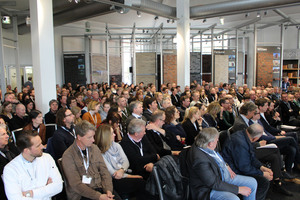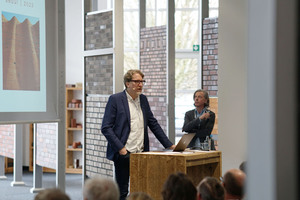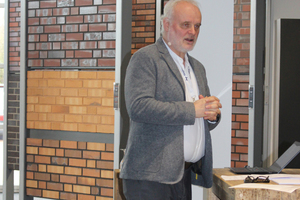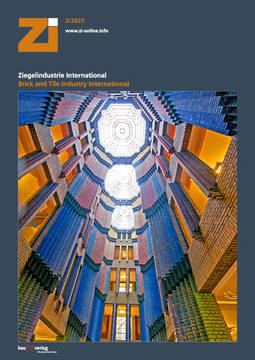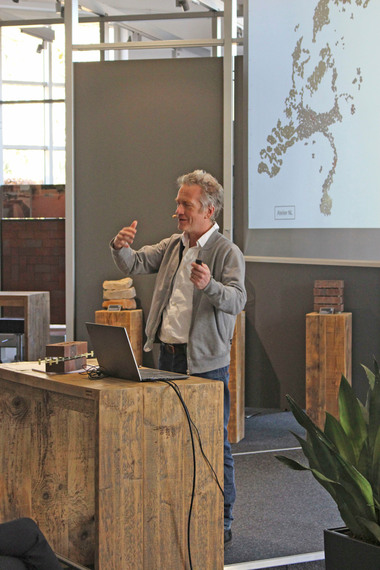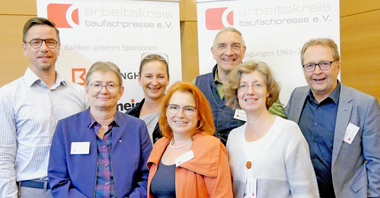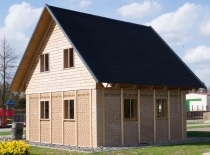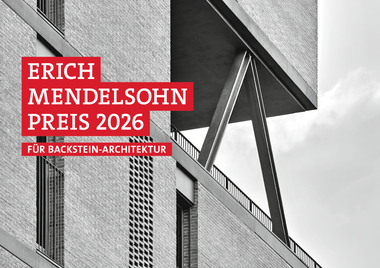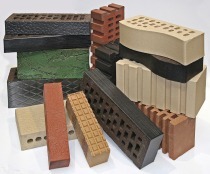Clinker seminar by Hagemeister on the exciting future of construction
How can the growing demands from an ecological, technical and economic perspective be translated into future-proof architecture with the demands of building culture and aesthetics? This topic was on the agenda at this year’s Hagemeister clinker seminar on 14 and 15 March 2023 under the title “Thinking architecture differently”.
A Ludwig van Beethoven statue as inspiration for a clinker facade? That was the starting point of the two speakers Martin Behet and Roland Bondzio from the office behet bondzio lin architekten for their award-winning project in Münster. The building envelope of the new office of the Association of the Northwest German Textile and Clothing Industry was to appear “like a cloth blowing in the wind”. Using the material clinker, a sophisticated play of light and shadow was created that resembles a textile texture. In their presentation “Parametric Design and Traditional Craftsmanship”, they used two examples to show how modern and traditional design go hand in hand. For the planned effect on the façade, a parametric computer programme helped to calculate a model in advance.
Creating living space
In her lecture “Germany - What’s next”, Christine Sohar, Associate at the international office MVRDV, explained how the city of the future can look like with sensible redensification. In the first part of her presentation, she went into detail about a current housing development in Franklin, Mannheim with 124 single-family houses and 26 flats, which will form an affordable and car-free neighbourhood in the future. In the second part, the speaker explained how the “Fuggerei of the future” could look like, based on the Fuggerei, the oldest existing social housing estate in the world. For this purpose, her office developed a modular system for urban development in order to implement the quality and sustainability of the Fuggerei in the future at different locations. The first projects are already underway in Germany and other parts of the world, e.g. in Sierra Leone.
The city of tomorrow
What can intelligent, climate-friendly urban development look like in the future? This was discussed by Prof. Dr. Jürgen P. Kropp from the Potsdam Institute for Climate Impact Research in his lecture “City in Climate Change: Perspectives and Solutions for the 21st Century”. Sustainability must be designed into a city so that it makes its contribution to solving climate and environmental issues. Compact development means congested heat in summer, while breaking up cities means greater distances and more individual traffic - and thus even more CO2 emissions. This is a typical conflict of goals. Solutions must not be considered in isolation. “For example, we could also live in more sprawling settlements if we create efficient and non-fossil-based transport options or develop innovative ideas for living and working.” Kropp stressed the need to integrate nature-based building materials, sustainable energy use and lots of greenery into urban planning. In addition, the topic of circularity will play a major role in the future. “We need to use resources where they can be produced locally and used sustainably.”
Consistent further construction
“It takes courage to save old things in order to use them freshly,” knows the last speaker, freelance architect and journalist Stefan Rethfeld from Münster. In his lecture “My house is many houses - On the old and new culture of building on”, he went on a journey through time. In many cities, countless buildings are still being demolished: from buildings from the Wilhelminian period and the 1920s to reconstruction buildings and properties from the 1990s. Individual houses and entire city quarters have disappeared in some cases. Using numerous practical examples, he showed how further construction can work. With a new awareness of the existing buildings, they can be usefully supplemented and thus live on. With Münster’s most prominent and currently much-discussed conversion task, the historic prison in the city centre, Rethfeld concluded with a significant appeal to the architecture plenum to continue building.
“In the run-up to the seminar, we had an exchange with the BDA Münster-Münsterland about which materials and construction methods can be used to design architecture in the future. There are currently many requirements to be met, from economic to ecological to architectural-cultural factors. There is a great deal of tension in which architecture is moving today. We wanted to give more space to this topic with the seminar,” says Managing Director Dr. Christina Hagemeister, explaining the relevance of the issue, and adds: “It is nice that the seminar could finally take place in the presence of the public again and was very well received by the numerous visitors. For us as organisers, this is the greatest praise.”

